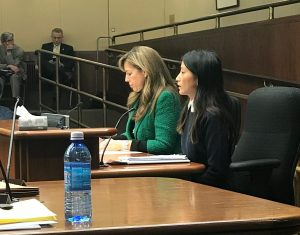
Citizens League Executive Director Pahoua Yang Hoffman, right, testifies in support of HF 3917 with Rep. Roz Peterson, co-sponsor of the bill.
The Citizens League supports a bipartisan bill (HF 3917) now moving through the state’s House of Representatives introducing reforms for the Metropolitan Council. The proposed reforms closely resemble the recommendations that came out of our Met Council Task Force in 2016, which laid out a series of recommendations in April of 2016 in the report The Metropolitan Council: Recalibrating for the Future.
The bill proposes the following changes to the regional governing body, which mirror Citizens League recommendations:
- Staggered 4-year terms for each Met Council member
In order to provide more continuity, encourage long-term thinking, and provide for better checks and balances, our task force concluded that terms for one half of the members should not be co-terminus with the Governor and that members not serve at the pleasure of the Governor.
- Expanding membership of the nomination committee
Our task force believed that the Metropolitan Council member selection process should include more input by citizens and local officials, strengthening the credibility of the Metropolitan Council, and further encouraging the appointment of well-qualified members.
- Additional information to be made publicly available as part of the member selection process, including publicly announcing three final candidates for each seat as submitted by the nominating committee.
There is a perception that the Metropolitan Council nominations committee is seen as an extension of the Governor’s office because it conducts the interviews and privately forwards the names to the Governor who makes the appointments. The changes proposed in this bill, and our task force recommendations, would make public the names and detailed qualifications of the candidates submitted to the Governor.
More about the Citizens League Met Council Task Force
From September 2015 to March 2016, the Citizens League convened a special task force to consider possible Metropolitan Council reforms in response to growing questions and concerns.
With the belief that the importance of the region is larger than just the sum of the interests of individuals, cities, counties, and even beyond the seven counties in the Metropolitan Council’s formal jurisdiction, the task force reviewed the Metropolitan Council’s performance against its goals; learned from a variety of stakeholders about the concerns raised; examined the tensions between the Metropolitan Council and counties, cities and individual Minnesotans; and discussed possible changes from the starting place of preserving and strengthening the Metropolitan Council’s regional effectiveness.